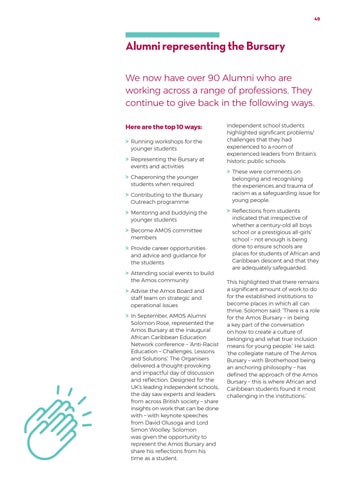49
Alumni representing the Bursary We now have over 90 Alumni who are working across a range of professions. They continue to give back in the following ways. Here are the top 10 ways: >> Running workshops for the younger students
>> Representing the Bursary at events and activities
>> Chaperoning the younger students when required
>> Contributing to the Bursary Outreach programme
>> Mentoring and buddying the younger students
>> Become AMOS committee members
>> Provide career opportunities
and advice and guidance for the students
>> Attending social events to build the Amos community
>> Advise the Amos Board and staff team on strategic and operational issues
>> In September, AMOS Alumni
Solomon Rose, represented the Amos Bursary at the inaugural African Caribbean Education Network conference – ‘Anti-Racist Education – Challenges, Lessons and Solutions’. The Organisers delivered a thought-provoking and impactful day of discussion and reflection. Designed for the UK’s leading independent schools, the day saw experts and leaders from across British society – share insights on work that can be done with – with keynote speeches from David Olusoga and Lord Simon Woolley. Solomon was given the opportunity to represent the Amos Bursary and share his reflections from his time as a student.
Independent school students highlighted significant problems/ challenges that they had experienced to a room of experienced leaders from Britain’s historic public schools:
>> These were comments on
belonging and recognising the experiences and trauma of racism as a safeguarding issue for young people.
>> Reflections from students
indicated that irrespective of whether a century-old all boys school or a prestigious all-girls’ school – not enough is being done to ensure schools are places for students of African and Caribbean descent and that they are adequately safeguarded.
This highlighted that there remains a significant amount of work to do for the established institutions to become places in which all can thrive. Solomon said: ‘There is a role for the Amos Bursary – in being a key part of the conversation on how to create a culture of belonging and what true inclusion means for young people.’ He said: ‘the collegiate nature of The Amos Bursary – with Brotherhood being an anchoring philosophy – has defined the approach of the Amos Bursary – this is where African and Caribbean students found it most challenging in the institutions.’



















